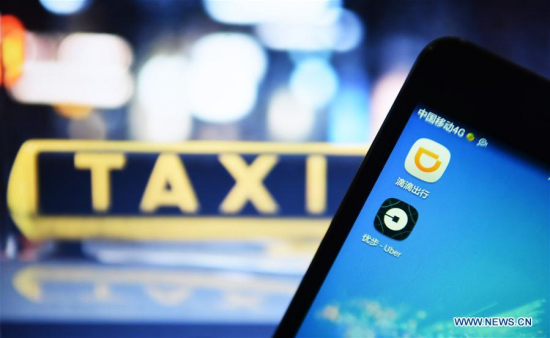
Photo taken on Aug. 1, 2016 shows Apps of Didi and Uber on a cellphone of a citizen in Hangzhou, capital of east China's Zhejiang Province. (Xinhua/Long Wei)
The surprise merger of China's two largest ride-hailing businesses, Didi and Uber, has stoked concerns over the possible rise of a monopoly and potential damage caused to the sharing economy business model.
Chinese on-demand mobility (ODM) firm Didi announced on Monday that it would effectively draw a line under the bruising competition between the two companies by taking over its U.S. rival, Uber's China business, creating a 35 billion U.S. dollar powerhouse.
Didi did not disclose the stake it will take in Uber, but it was reported that Uber will hold a 5.89 percent stake in Didi. Despite the merger, Uber's China service will continue to operate independently.
The two companies have been locked in a bitter battle for business in China, which has been marked by huge customer discounts.
"Uber has been a grand rival and we have had an epic battle ...We raged an earth-shaking war, and when we join hands, our love will last until the end of time," Didi CEO Cheng Wei and President Jean Liu wrote in an internal email on Monday.
Cheng and Liu pointed out that the intense rivalry helped the two parties to grow quickly and contributed to soaring market growth, making China the world's largest ODM market.
FEAR OVER A RISING GIANT
The merger made headlines, with many Chinese customers worried about the prospect of higher fares and drivers concerned about lower pay as the two companies could form a monopoly that disrupts market competition.
In the first quarter of the year, Didi took the lead in the ODM market with a market share of over 85 percent, followed by Uber, Yongche, and Shenzhou Zhuanche. The combined market share of Didi and Uber reached over 93 percent, according to a report from data provider CNIT-Research.
"I am worried about fewer discounts and higher fees," said Wang Rong, a 27-year-old resident of Hangzhou, capital of eastern China's Zhejiang Province.


















































